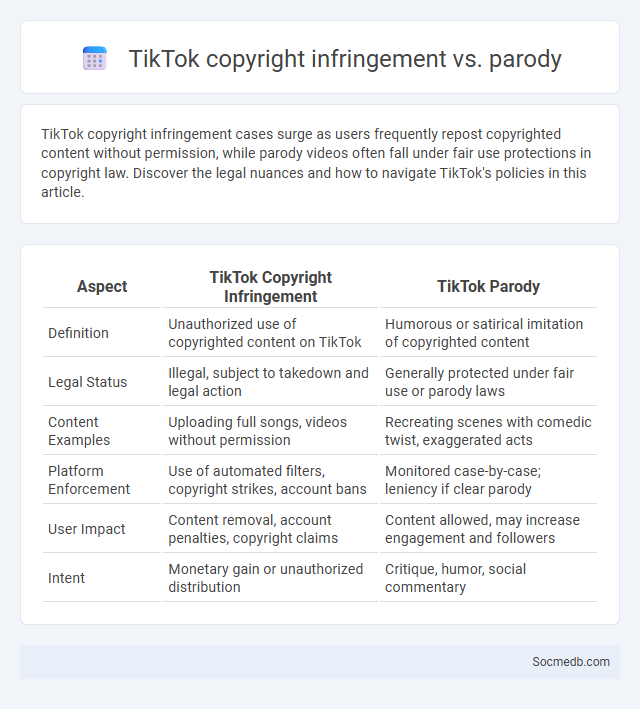
Photo illustration: TikTok copyright infringement vs parody
TikTok copyright infringement cases surge as users frequently repost copyrighted content without permission, while parody videos often fall under fair use protections in copyright law. Discover the legal nuances and how to navigate TikTok's policies in this article.
Table of Comparison
| Aspect | TikTok Copyright Infringement | TikTok Parody |
|---|---|---|
| Definition | Unauthorized use of copyrighted content on TikTok | Humorous or satirical imitation of copyrighted content |
| Legal Status | Illegal, subject to takedown and legal action | Generally protected under fair use or parody laws |
| Content Examples | Uploading full songs, videos without permission | Recreating scenes with comedic twist, exaggerated acts |
| Platform Enforcement | Use of automated filters, copyright strikes, account bans | Monitored case-by-case; leniency if clear parody |
| User Impact | Content removal, account penalties, copyright claims | Content allowed, may increase engagement and followers |
| Intent | Monetary gain or unauthorized distribution | Critique, humor, social commentary |
Understanding Copyright Laws on TikTok
Understanding copyright laws on TikTok is essential for content creators to avoid legal issues and account suspensions. TikTok's copyright policies require users to respect intellectual property rights by using only authorized music, videos, and other copyrighted materials. Familiarity with the Digital Millennium Copyright Act (DMCA) and TikTok's copyright infringement procedures helps creators navigate content sharing while protecting original works.
Defining Copyright Infringement on Social Platforms
Copyright infringement on social media occurs when users upload, share, or distribute content such as images, videos, music, or text without the permission of the copyright holder. Social platforms implement algorithms and reporting mechanisms to detect and remove unauthorized content to protect intellectual property rights. Understanding your rights and responsibilities on these platforms helps prevent legal issues and safeguards your original creations.
What Constitutes Parody Under Copyright Law?
Parody under copyright law involves using elements of an original work to create a new work that humorously comments on or criticizes the original. Your use of copyrighted material in social media content can qualify as parody if it provides social commentary or criticism, transforming the original work sufficiently to be considered fair use. Courts assess factors like the purpose, nature, amount of the original work used, and the effect on the market value to determine if your parody is lawful.
Key Differences: Parody vs. Copyright Infringement
Parody on social media involves transformative use of copyrighted material for comedic or critical expression, often protected under fair use laws, whereas copyright infringement occurs when content is used without permission, violating the original creator's exclusive rights. Parody must provide commentary or critique, clearly distinguishing itself from the original work, while copyright infringement replicates or distributes content without authorization, causing potential legal consequences. Understanding these distinctions helps content creators navigate intellectual property rights and avoid legal disputes on platforms like YouTube, Instagram, and TikTok.
TikTok’s Policies on Copyrighted Content
TikTok's policies on copyrighted content strictly prohibit the upload, sharing, or distribution of materials that infringe intellectual property rights, ensuring compliance with the Digital Millennium Copyright Act (DMCA). The platform employs automated detection systems and user reports to identify and remove infringing content promptly, providing a notice-and-takedown mechanism for copyright holders. Repeat infringers face account suspension or termination, reinforcing TikTok's commitment to protecting creators' original works.
Common Examples of Infringement on TikTok
Common examples of infringement on TikTok include unauthorized use of copyrighted music, sharing videos without proper permissions, and reposting content that violates intellectual property rights. These violations can result in content removal, account suspension, or legal repercussions. Protecting your original creations and respecting others' rights is crucial for a positive TikTok experience.
Legal Protections for Parody on Social Media
Parody on social media is protected under fair use and free speech laws, allowing creators to critique or satirize public figures and content without infringement claims. The U.S. Copyright Act and First Amendment offer legal safeguards, but your parody must clearly transform or comment on the original work. Understanding these protections helps you navigate disputes and defend your creative freedom in digital spaces.
Risks of Uploading Copyrighted Material on TikTok
Uploading copyrighted material on TikTok poses significant legal risks, including potential copyright infringement claims that can result in account suspension or termination. TikTok's automated content identification system, powered by AI, actively detects unauthorized use of copyrighted music, videos, or images, leading to content removal or muted audio. Users risk financial penalties and damage to their reputation by disregarding copyright laws, highlighting the importance of obtaining proper licenses before sharing protected content.
How Creators Can Avoid Copyright Issues
Creators can avoid copyright issues on social media by using royalty-free or licensed content, ensuring they have explicit permission for any third-party materials, and understanding fair use policies. Proper attribution and utilizing platform-specific content libraries help protect against infringement claims. Regularly reviewing copyright guidelines and employing digital tools for plagiarism detection further minimize legal risks.
Recent Case Studies: Infringement vs. Parody on TikTok
Recent case studies on TikTok highlight the complex legal boundaries between copyright infringement and parody, emphasizing user-generated content's role in defining fair use. Courts have scrutinized how creators transform original works through satire or commentary, determining whether such use qualifies as protected parody or unauthorized duplication. These rulings impact content moderation policies and influence how brands and influencers navigate intellectual property rights on social media platforms.
 socmedb.com
socmedb.com